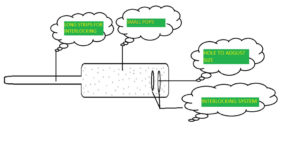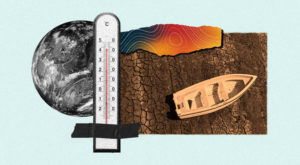Down in the dumps, Indonesia struggles to control growing amounts of Covid-19 waste
At the Burangkeng dumpsite on the eastern edge of Indonesia’s capital, green and blue surgical masks and white rubber gloves are strewn among the detritus of daily household living.
Under the scorching sun, waste picker Oom Komalasari, 48, protected by only socks and gloves, sifts through the refuse for anything of value as goats scavenge the same foul-smelling trash for food.
She then hikes to the mountain of solid waste churned out by three bulldozers moving at a full throttle, as trucks line up to unload their trash.
Even prior to the coronavirus pandemic, the single mother of five had often found medical waste such as needles and intravenous fluid bottles scattered among the garbage. But now there is more.
“Nearby factories dispose of their masks and gloves here and many more have been thrown here lately,” Ms Oom told The Straits Times during her break.
The situation is not unique to Burangkeng. In late May last year, sheet piles at the Cipeucang dumpsite on the western edge of Jakarta collapsed, sending debris including masks and gloves into the Cisadane River. The river is the main source of water for Tangerang city’s nearly 2.3 million residents.
Environment group Banksasuci Foundation found around 50 items of medical waste, including masks, in the river each day from the end of May to July last year, after which the numbers declined gradually.
The two dumpsites illustrate the struggle faced by Indonesia’s 270 million people to manage the nation’s huge mountains of waste, which has been exacerbated by the pandemic.
Indonesia is still struggling to contain the number of coronavirus infections. The country has suffered South-east Asia’s worst coronavirus outbreak.
Long before the pandemic, medical waste was already dumped on empty land and into watersheds and rivers in Jakarta and its satellite towns, despite environmental rules, said Mr Bagong Suyoto, head of the coalition.
“After the pandemic we found many more places made into illegal dumping sites for the medical waste,” he said. “Most were masks.”
Last October, used Covid-19 test kits and hazmat suits from a health clinic in the nearby Jababeka industrial estate were found on a street side in Bekasi, local media reported. Instead of incinerating the waste or hiring a waste disposal company, the clinic had resorted to illegal dumping instead.
To address reports of medical waste management, the Environment and Forestry Ministry ordered regional governments on Oct 27 last year to bar hospitals and other healthcare facilities from disposing their waste in landfills, which are intended for household trash only.
The Environment and Forestry Ministry estimates medical waste has increased between 30 per cent and 50 per cent since last March.
In total, medical waste generated from the start of the pandemic in March to October last year across Indonesia’s 34 provinces amounted to 1,662.75 metric tonnes, the ministry’s director general for management of rubbish, waste and toxic and hazardous materials Rosa Vivien Ratnawati said last November.
Only 118 hospitals out of 2,925 hospitals and community health centres nationwide operate incinerators, while only 17 waste disposal companies are licensed to manage toxic and hazardous materials, and all are located on Java island.
That leaves about 88 metric tonnes of medical waste that cannot be managed properly each day due to the lack of facilities, according to the ministry’s estimate.
The government plans to build 32 waste management facilities to tackle toxic and hazardous waste by 2024.
Despite the enormous challenges, a few regions have managed to set up a system to address Covid-19 related waste smoothly.
Jakarta, for instance, has provided special bins for medical waste at some 200 temporary disposal sites as well as disposal sites dedicated for toxic and hazardous materials across the city, while residents can also hand over masks to waste pickers circulating in neighbourhoods. The city has hired PT Wastec International to collect the masks from municipal disposal sites for incineration.
Disposable mask waste produced by Jakarta residents totalled 203kg in April last year, when the city’s environment agency first collected the data. As of December last year, this figure amounted to 1.21 metric tonnes.
Mr Amri Restu Rianto, who supervises the Kramat Jati disposal site in East Jakarta, said that prior to the pandemic, masks were treated as residual waste with no economic value and were consequently dumped into the Bantargebang landfill in Bekasi, West Java.
Bantargebang is the largest landfill in South-east Asia. The Kramat Jati disposal site collected 128.3kg of masks from April to December last year.
“During the pandemic, disposable masks have been treated differently as they are considered infectious waste,” Mr Amri said, adding that this practice will likely continue even after the pandemic ends.
Mr Muhammad Reza Cordova, a researcher at the Indonesian Institute of Sciences’ (Lipi) Research Centre for Oceanography, said that the government had to act promptly to build incinerators as the pandemic continues to grip Indonesia, to avert improper disposal, particularly in waterways and the ocean.
Healthcare waste made up 16 per cent of the total garbage floating in Cilincing and Marunda estuaries in Jakarta Bay in March and April last year, according to Lipi’s survey.
Plastic waste remains a huge problem for Indonesia, the second biggest marine plastic polluter after China. Plastic waste fouls many major rivers in Indonesia, which then washes out to sea where bottles to food packets to flip flops wash up along coastlines across the archipelago. The waste can ensnare sea animals or is eaten by birds, turtles or whales that mistake it for food.
“Our biggest concern is that the masks can serve as a new source of micro plastics polluting the ocean,” Mr Reza said, adding that when fish and other animals eat the tiny plastic particles, it could be detrimental to human health when people eat tainted seafood.
Jakarta Environment Agency spokesman Yogi Ikhwan said: “With the presence of a proper system in medical waste management, the increase in mask waste should not create a new problem to the environment.”
At the Kramat Jati disposal site, waste sorter Mr Mirta fears catching the virus. He says he always wears personal protection equipment while sorting out masks from all over East Jakarta.
“Performing my duty makes me scared. I fear that I will bring the virus home and spread it to my family,” the father of two said.
In contrast, at Burangkeng landfill, Ms Oom, wearing neither mask nor boots, ruled out the possibility of contracting Covid-19 as she believes the coronavirus would not survive the heat generated by the garbage.
In her 17-year job of sorting trash there, she said she only got sick occasionally and sought treatment for either itchy skin or the flu.
“Whether we catch the disease or not depends on our fate. It’s about destiny,” she said.
This piece was produced by The Straits Times and shared as part of the World News Day initiative




